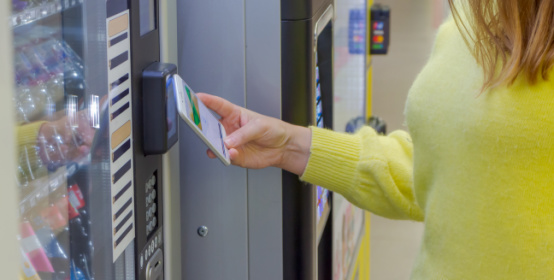
Step aside, clunky soda machine. There's a new generation of vending machine, and they're having a moment right now. Many of them were deployed during the height of the COVID-19 pandemic as a way for vendors to serve customers with minimal contact. Some areas even saw vending machines arise as an alternative to take-out pizza restaurants or corner stores.
Even as people have started to adapt to COVID-19 and have been shopping in stores and going to restaurants, these machines are still growing in popularity. Research estimates that the market share for smart vending machines could reach the multi-millions by 2026. This new tech seems to have a lot to offer users and vendors alike, but what is it and what can it do?
A smart vending machine is just a higher-tech version of their conventional brethren. These new machines offer digital payment options, ordering apps, and sometimes cloud connectivity. They're able to do all of the things that a regular snack machine can do, and then some.
For customers and vendors, smart vending machines provide:
Fast, Secure Transactions
How many times have you gone to an old-fashioned vending machine, only to walk away disappointed because you didn't have the right amount of cash on you? In an increasingly cashless society, the ability to use different payment options in a fast, safe way is a must. A lot of vending machines accept credit cards, so expanding into digital payment options was only natural.
This means that more customers can get what they want, and vendors are able to make more money by serving more people. It's a win-win.
Touchless Ordering via Apps
When people became more cognizant of the potential for surfaces to transmit disease, a lot of retailers and restauranteurs rushed to provide touchless options. Vending machines were no different. Rather than supply the same old keypad that lacks an easy way to sanitize it, many smart vending machines started using ordering apps.
People can use their own phones to place their orders, then just pick them up at the machine. It's fast, secure, and reduces the potential for infection.
Remote Monitoring Capabilities
Have you ever walked up to an old vending machine just to see that it's poorly stocked, broken, or has multiple packages jammed from failed orders? Smart vending machines offer a way around this. Since they have internet connectivity, vendors can monitor their machines remotely at all hours of the day. If there's an issue, they can swiftly detect and fix it.
This helps customers by making sure that machines are well-stocked and in good working order. It also helps vendors, because it's much more efficient and cost-effective to service machines when needed rather than send employees around to inspect each one.
Analytics
Smart vending machines are capable of compiling user data. They can determine what sells the most, what locations get the most traffic, and what time of day the machine sees peak usage. This is invaluable for vendors, since it lets them know which machines need to be restocked more frequently, and what kinds of products customers want. AI-driven analytics can also develop routes for restocking that helps maximize efficiency and ensure product quality. Gone are the days of walking up to an old-fashioned soda machine and finding nothing but a bottle of tonic water!
Sensors
The sensors on smart vending machines do more than just track usage. They can also monitor environmental conditions to provide vendors with data on seasonally appropriate offerings, and help ensure that perishable items are handled appropriately.
Combining data like weather forecasts, important dates, and usage patterns gives vendors an unprecedented level of power to meet their customers' needs.
Promotional Screens
Conventional vending machines relied heavily on just being vending machines. Their presence alone advertised snacks or beverages, and it was up to the consumer to get close enough to see if there was anything they wanted. With smart vending machines, vendors are less limited.
These machines can be equipped with LCD screens that show promotional material about the products inside. This can catch the attention of passers-by, enticing them to make a purchase.
While smart vending machines are leagues ahead of their old-school counterparts, they do still have some limitations when compared to a regular store.
For example, the ability to hold and touch a product does a lot to sell it to a consumer. That tactile sensation conveys a sense of ownership, so people are much more likely to buy something that they can physically handle. This experience isn't really something that vending machines can offer yet by their very nature, and smart machines are no different.
As with anything else with internet connectivity, smart vending machines are hackable. They require a good cyber security strategy to protect inventory, money, and user data.
These machines also require specialized maintenance. They're a fair bit more complex than a regular vending machine, so they can be more expensive to fix when something goes wrong.
If you're looking to upgrade to a smart vending machine platform, or want to expand your business in a way that requires less overhead and commitment than a brick-and-mortar establishment, this technology holds a lot of promise. The market seems like it's going to continue to expand, and for good reason. Smart vending machines are faster, more hygienic, and more user-friendly for both consumers and vendors alike.